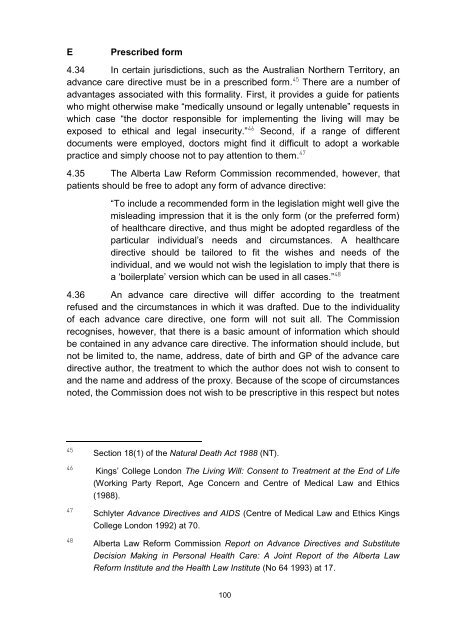Consultation Paper on Bioethics - Law Reform Commission
Consultation Paper on Bioethics - Law Reform Commission
Consultation Paper on Bioethics - Law Reform Commission
You also want an ePaper? Increase the reach of your titles
YUMPU automatically turns print PDFs into web optimized ePapers that Google loves.
E Prescribed form<br />
4.34 In certain jurisdicti<strong>on</strong>s, such as the Australian Northern Territory, an<br />
advance care directive must be in a prescribed form. 45 There are a number of<br />
advantages associated with this formality. First, it provides a guide for patients<br />
who might otherwise make “medically unsound or legally untenable” requests in<br />
which case “the doctor resp<strong>on</strong>sible for implementing the living will may be<br />
exposed to ethical and legal insecurity.” 46 Sec<strong>on</strong>d, if a range of different<br />
documents were employed, doctors might find it difficult to adopt a workable<br />
practice and simply choose not to pay attenti<strong>on</strong> to them. 47<br />
4.35 The Alberta <strong>Law</strong> <strong>Reform</strong> Commissi<strong>on</strong> recommended, however, that<br />
patients should be free to adopt any form of advance directive:<br />
“To include a recommended form in the legislati<strong>on</strong> might well give the<br />
misleading impressi<strong>on</strong> that it is the <strong>on</strong>ly form (or the preferred form)<br />
of healthcare directive, and thus might be adopted regardless of the<br />
particular individual‟s needs and circumstances. A healthcare<br />
directive should be tailored to fit the wishes and needs of the<br />
individual, and we would not wish the legislati<strong>on</strong> to imply that there is<br />
a „boilerplate‟ versi<strong>on</strong> which can be used in all cases.” 48<br />
4.36 An advance care directive will differ according to the treatment<br />
refused and the circumstances in which it was drafted. Due to the individuality<br />
of each advance care directive, <strong>on</strong>e form will not suit all. The Commissi<strong>on</strong><br />
recognises, however, that there is a basic amount of informati<strong>on</strong> which should<br />
be c<strong>on</strong>tained in any advance care directive. The informati<strong>on</strong> should include, but<br />
not be limited to, the name, address, date of birth and GP of the advance care<br />
directive author, the treatment to which the author does not wish to c<strong>on</strong>sent to<br />
and the name and address of the proxy. Because of the scope of circumstances<br />
noted, the Commissi<strong>on</strong> does not wish to be prescriptive in this respect but notes<br />
45 Secti<strong>on</strong> 18(1) of the Natural Death Act 1988 (NT).<br />
46 Kings‟ College L<strong>on</strong>d<strong>on</strong> The Living Will: C<strong>on</strong>sent to Treatment at the End of Life<br />
(Working Party Report, Age C<strong>on</strong>cern and Centre of Medical <strong>Law</strong> and Ethics<br />
(1988).<br />
47 Schlyter Advance Directives and AIDS (Centre of Medical <strong>Law</strong> and Ethics Kings<br />
College L<strong>on</strong>d<strong>on</strong> 1992) at 70.<br />
48 Alberta <strong>Law</strong> <strong>Reform</strong> Commissi<strong>on</strong> Report <strong>on</strong> Advance Directives and Substitute<br />
Decisi<strong>on</strong> Making in Pers<strong>on</strong>al Health Care: A Joint Report of the Alberta <strong>Law</strong><br />
<strong>Reform</strong> Institute and the Health <strong>Law</strong> Institute (No 64 1993) at 17.<br />
100

















